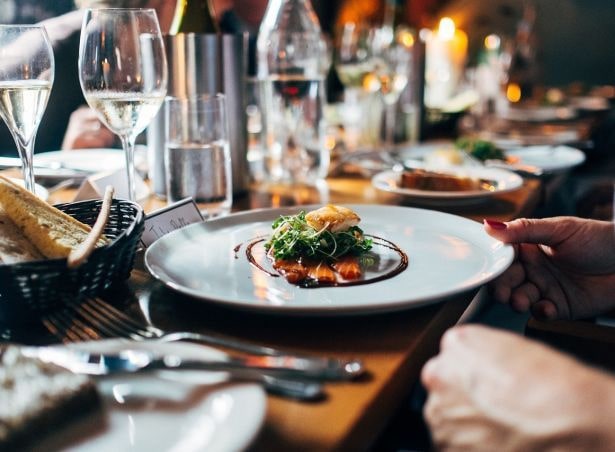
In the UK, new restaurant openings in our towns and cities are at an all-time high, and there are plenty of people wanting to take the plunge into the dynamic and passionate world of restaurant ownership. See our insights on what makes or breaks a restaurant here:
In the UK, new restaurant openings in our towns and cities are at an all-time high, and there are plenty of people wanting to take the plunge into the dynamic and passionate world of restaurant ownership.
Tibard manufacture and supply restaurant uniforms and have done so for 40 years – so you can be sure that we know plenty about the hospitality industry. If you are interested in how to open a restaurant, read on for the key considerations.
Have a killer concept and make it work
There are plenty of news stories about people leaving non-hospitality jobs and opening their own restaurant, eventually going on to be successful and able to expand into small restaurant empires. There are even more restaurants that are opened by industry veterans, chefs or restaurant managers who want to pave their own way.

Unfortunately, the best and most prepared can see their restaurants failing – as booming as hospitality is, you will only succeed if you have a great concept and implement it in a great way.
We cannot tell you what your concept will be, but you can certainly run it past friends, colleagues and family members to 'sense check' it. Importantly, these concepts do not need to be innovative or ground-breaking – more often than not, it is choosing to do one thing and do it well. Some of the newest and most popular restaurant concepts have evolved from street food where a single killer product, done perfectly, gives the operator a baseline from which to create a restaurant.
A Restaurant is a Business
If you want to open a restaurant you need to approach it as a business first and a passion project second. Take stock of the financial responsibilities of your restaurant first of all and make sure you have a defined company description. You may know what you want to do in theory however having a physical business plan to reference back to can help keep you on track. A business plan can be as long as you want but try to get down an executive summary of the restaurant, a checklist of what your business needs to succeed and your approach to problem-solving.
Furthermore having a business plan to present to potential investors will show you’re serious.
Opening a restaurant costs… a lot or a little depending on what you do
Even a killer concept cannot help with one of the harshest realities of opening a restaurant – the sometimes astronomical costs of opening.
The launch of a brand new restaurant is a monumental task; you’re investing an incredible amount of time, energy and emotion before opening day. Furthermore, with large restaurant setup costs easily surpassing £2m, there’s an undeniable risk to taking your first steps to becoming a restaurateur.
However, do not let this put you off and don’t feel the need to add ostentatious flourishes to your venue just to compete with current trends in the restaurant business. Many of the bigger openings you’ll see splashed through the media are funded by specialist restaurant investors who can absorb some of the financial costs.
Before starting your first restaurant, you need to take an objective look at the running costs, make a checklist for what you’ll need in the first six months of the business- you can always add embellishments at a later date.

A restaurant’s budget and general costs will vary massively depending on what type of operation you are looking to run, who the clientele is likely to be and the local competition. Before you open your restaurant start-up consider how dramatically costs can be reduced by taking over an existing operation – perhaps one that is being sold by the current owners – here you will likely have all the fixtures and fittings that a restaurant requires without having to source them yourself.
A revolutionary way of opening your restaurant is to not open one at all – instead, the rise of street food and event catering has seen food trucks take off in a way never seen before in the UK.
There are still costs to start up, but there is nothing like those of bricks and mortar restaurant. Instead, you need a food trailer, or temporary location along with branding and equipment and take yourself to the customers- starting a catering company can also be a great way to test the water for a new restaurant idea without the financial responsibility of a real estate and renting a property.
An integral part of opening a restaurant or launching a new catering company will be getting the right staff. While you can rely on part-time and shift workers for the bulk of your back and front of house staff, you’ll need to invest in a reliable head waiter and head chef. Getting a great manager in the front of your restaurant can increase productivity, profit and save you time and money training new staff. A talented head chef will undoubtedly be a huge draw and can instantly bolster the reputation of a new restaurant. Consider the costs of these two particularly posts as an investment in the overall quality of your restaurant.
Food is the foundation of a successful restaurant
Regardless of how well you know your target customers, how much time you’ve spent schmoozing critics and the quality of your business plan, a restaurant’s success and longevity depends on food. A great menu doesn’t have to cost the earth but the food needs to be quality, and each dish needs to be carefully considered before you present it your audience. Whether you’re providing a culinary experience or a comforting family-friendly hangout people should be excited about what you’re serving.

Be warned, only the strongest of concepts survive as restaurateurs and caterers you’re unlikely to make it in this industry if your food offering is weak.
Concerning food, produce and drinks – these will all depend on the style of restaurant. Cheap eats and casual dining can benefit from buying from large wholesalers such as Bidfood or Brakes whereas more expensive venues – who emphasised the quality of the ingredients will likely be sourcing from specialist butchers and small farms.
Profit margins need to be considered when purchasing ingredients as well as trends and within your desired clientele.
Know your location
When it comes to opening a restaurant one of the most important factor is: “Location, location, location.”
While London and Manchester are two prime spots in the UK for new restaurants, don’t aim for a city centre opening if you don’t know the area. In ten years, after you know more about the business, you may choose to open a restaurant in London or another cosmopolitan location.
Knowing the social and cultural landscape of your new restaurant’s site whether that’s a town or city location can help you understand the potential customers who could be walking through your door. Streetchecker UK and the Office of National Statistics can help you see what demographics make up your chosen area and the viability of your concept within that vicinity. However, there’s only so much information you get from online research, spend time within the community and get to know the personality and the values of those people and will increase your chances of learning those key details that will make your restaurant opening a success. Learning the ‘personality’ of your restaurant is an important part of the market research and just another thing to tick off your checklist.

As can be imagined, the best locations will come with the highest price tags. This could be in the central areas of cities and towns or on busy roads near popular amenities – the higher the footfall and visibility, the higher the rent and rates will be. Areas like shopping centres and retail parks will be off limits as they prefer their new openings to be established casual dining brands.
When searching for the right location, ensure that you do your due diligence and involve local commercial property experts, research if there have been any planning permission granted in the area that might ruin the ambience of your future restaurant.
Location needs to be carefully considered when setting up your first restaurant, don’t make any rash decisions or go with the first unit you see. Will your restaurant still be popular in the area for the next ten years? Does it have enough space for any expansion? Finally, during the hard times when you’re barely breaking even, will you still be able to cover the bills?
Recruitment matters
Restaurants are the ultimate personification of the hospitality industry as it’s more than just the sum of its parts. You’re providing great food, a pleasant environment to eat in and the premium service of your exemplary front of house team.
The expectations of the restaurant dining experience have risen dramatically in the past few years. People are more than capable of cooking a meal at home and with apps like Just Eat and Deliveroo, you can get great food delivered to the comfort of your home- meaning that the restaurant experience needs to offer something more.
Getting the right staff can essentially make or break your restaurant, especially the front of house. Your wait staff and hosts are the faces of the brand, and if they aren’t up to par, then your customers will go somewhere they do feel appreciated.
Your FOH team needs to have excellent interpersonal skills, a positive attitude and be very clear communicators. Again when you’re hiring the restaurant manager, you need to look at how good they are at training new staff. It’s quite common for new Front of House hires to be young, full of enthusiasm but lacking experience but as long as they are willing to learn and your Head of FOH have the patience to teach you’ll be onto a winning recipe.
If you’re planning on being the Head Chef at your future restaurant, then you need to hire chefs you’ll be able to work with, this is both a blessing and a curse. You will know what sort of environment you enjoy working with and the work ethic, personality and experience you expect from your team.
Launching your new restaurant concept
Love what you do otherwise it’s going to be a long and hard road to success.
While opening a restaurant is hard, owning and operating a restaurant is harder still… there is no book on running a restaurant for dummies. You have to be responsive, deal with numerous problems – often all at once – while ensuring that day to day customers leave happy, and you are making a profit.

When deciding on the concept of your restaurant, we advise you don’t bow to trends just for the sake of bringing through a fashionable crowd. Remember how everything needed to be low-carb ten years ago or when cupcakes were the ‘it’ food? Building a restaurant around what’s popular at that very moment will result in it falling out of vogue moments after opening day.
Your concept needs to be something you can see yourself championing in five years, perhaps you’re inspired by childhood comfort food, or you’re passionate about the benefits of using local ingredients. Either way, you need to be proud of what you’re doing, inauthenticity can only get you so far in the restaurant industry.
Marketing your new restaurant
You can have the best restaurant in the world; however, if no one knows about it, then you’re not going to make much of a profit. Contact local newspapers and bloggers to review and make sure you invest in local advertising leading up to the launch.
If you have it in the budget invest in a PR agency for the first six months or longer as they’ll get the word out for you. Or write up a press release yourself, covering when the restaurant’s going to open and what makes it special and then send it out to journalists who cover stories about new restaurant openings in your area.
Also, make sure you check out Tibard’s ‘Restaurant Digital Marketing’ blog for simple ideas on how to spread the word online.
Before you launch discuss marketing strategies with your restaurant manager and head chef, they might have some industry contacts who will increase awareness of your restaurant.
Taking the first step
Launching a restaurant can be on the most exciting moments of your life, but at Tibard we’ve worked with 100s of restaurants across the country and would be remiss if we didn’t tell you its hard work. But at the end of the day, it can be one of the best experiences of your life, good look and we look forward to dining at your restaurant in the future.